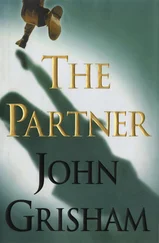Lacy was suddenly hit with a memory and her knees went weak. She gasped and bent over, hands on knees, trying to breathe.
“Are you okay?” Jeri asked, touching her shoulder.
“No. Sorry. Just give me a moment.”
Darren looked at Jeri and said, “It’s her car wreck, the one where Hugo was killed. Not that long ago.”
Jeri said, “I’m so sorry, Lacy. I just wasn’t thinking.”
She stood and took a deep breath.
“We should’ve brought some water,” Jeri said. “I’m sorry.”
“It’s okay. I’m fine now. Let’s get out of here and report this to the FBI. They can handle the search.”
Jeri said, “Okay, but first I want to see what’s in that glove box.”
Parked five feet away was a large Ford with a crushed roof. Darren poked around it and found a torn piece of the left door rocker panel. He twisted it free and eased into the seat of the gray Chevy truck. He jammed his new tool into the damaged glove box but it would not open. He pried, shoved, dug, jammed again and again, but its door would not open. The glove box was partially crushed and locked tight.
“I thought you were stronger than that,” Lacy observed as she and Jeri watched every move.
Darren glared at her, took a deep breath, wiped his forehead, and attacked the glove box again. He finally pried open a narrow gap and managed to snap off the door.
He grinned at Lacy and Jeri and tossed his tool into the weeds. He pulled his gloves tight, then slowly removed a plastic bifold; a brochure for tire warranties; a receipt for an oil change, charged to a Mr. Robert Trager; a AAA solicitation of some variety; and two rusted screwdrivers.
He handed the bifold to Jeri and got out of the truck. The three of them stared at their loot. “Should we open it?” Lacy asked.
Jeri held it with both hands and said, “Odds are Bannick touched this at some time. Odds are he didn’t wipe it down, couldn’t have really, at least not in the past month when he was scrubbing everything else.”
Lacy said, “Let’s play it safe and take it to the FBI.”
“Yes, absolutely. But let’s have a peek first.” She slowly opened the bifold and removed the owner’s manual. Stuffed inside it were extended warranty papers, an old Florida registration card issued to Robert Trager, and two receipts from an auto parts store.
A card fell out and floated to the ground. Lacy picked it up, read it, smiled, and said, “Bingo.”
It was a State Farm insurance card issued to Waveland Shores, one of Bannick’s fronts. It covered the six-month period from January to July of 2013, and listed the policy number, limits of coverage, VIN, and agent’s name. On the back side were instructions on what to do in case of an accident. She showed it to Jeri and Darren, who were afraid to touch it, then placed it back in the owner’s manual.
Jeri said, “I like our odds right now.”
“I’m calling Clay Vidovich,” Lacy said as she pulled out her phone.
They hiked for ten minutes until they saw Herman in his golf cart. He drove them to the front where they checked in with Ernie, who, of course, wanted $10 for the owner’s manual. Lacy bargained him down to $5, to be covered by the taxpayers of Florida, and they left Dusty’s.
An hour later, they were in downtown Pensacola having a soda in the conference room with Vidovich and Agents Neff and Suarez. As they detailed their adventure, two technicians were poring over the manual, insurance card, and other items from the glove box.
Vidovich was saying, “Yes, we’re heading out in the morning, flight’s at eight. We’ll get back to Washington in the afternoon. Thanks to you, Jeri, it’s been a rather productive trip, wouldn’t you say?”
“It’s a mixed bag,” she said without a smile. “We found our man, but he got away, on his own terms.”
“The killings have stopped, and that’s not always the case. We can close this one, but we have others.”
“How many, if I may be so bold to inquire?” Darren asked.
Vidovich looked at Neff, who shrugged as if she couldn’t say.
“About a dozen, of all varieties.”
“Anyone like Bannick?” Lacy asked.
He smiled and shook his head. “Not that we know of, and we don’t pretend to know them all. Most of these guys kill at random and never know their victims. Bannick was certainly different. He had a list and he stalked them for years. We would have never found him, Jeri, without you.”
The door opened; a technician walked in and said, “We have two very good thumb prints, both from the insurance card. I just sent them to the lab at Clarksburg.”
He left and Vidovich followed him out.
Suarez said, “They’ll give them priority and ram them through the data banks. We can check millions of prints in a matter of minutes.”
“Pretty amazing,” Darren said.
“It is.”
Lacy asked, “So, if there’s a match, what happens?”
“Not much,” Neff said. “We’ll know for sure that Bannick killed Verno and Dunwoody, but it will be impossible to pursue the case.”
“If he were alive?”
“Still a tough one. I wouldn’t want to be the prosecutor.”
“What about the other murders?” Jeri asked.
Suarez said, “Not much we can do, really. I’m sure we’ll meet with the local police and pass along the news. They’ll meet with the families, if the families are up to it. Some will want to talk, others will not. What about your family?”
Jeri said, “Oh, I’m sure I’ll tell them at some point.”
The conversation waned as they waited. Darren went to the men’s room. Lacy freshened the soft drinks.
Vidovich returned with a smile and said, “We have a clear match. Congratulations. It can now be proven that Judge Bannick did indeed kill Lanny Verno and Mike Dunwoody. At this point, folks, that’s the best we can hope for.”
Lacy said, “I need a drink.”
Vidovich said, “Well, I was thinking about a drink followed by a long, celebratory dinner. Courtesy of the FBI.”
Jeri nodded her approval as she wiped tears.
Two weeks later, Lacy and Allie flew to Miami, rented a car, and made a leisurely drive down Highway 1, south through Key Largo to Islamorada, where they stopped for a long lunch on a patio at the water’s edge. They continued on, passed through Marathon, then stopped when the highway ended in Key West. They checked into the Pier House Resort and got a room on the ocean. They splashed in the water, walked through the sand, lounged on the beach, and had a cocktail watching a beautiful sunset.
The following day, a Saturday, they left Key West, drove an hour to Marathon, and found the Kronke home in Grassy Key, a plush, gated community on the water. Their appointment was for 10:00 a.m. and they arrived a few minutes early. Jane Kronke greeted them warmly and led them to the patio where her two sons, Roger and Guff, were waiting. They had driven down from Miami the day before. Minutes later, Chief Turnbull of the Marathon Police arrived. Allie excused himself and took his coffee to the front of the house.
After the obligatory round of chitchat, Lacy said, “This won’t take long. As I said on the phone, I’m the interim director of the Board on Judicial Conduct and it is our duty to investigate complaints of misconduct filed against state court judges. Back in March, we met with a woman whose father was murdered in 1992, and she claimed she had learned the identity of his killer. She filed a formal complaint and we were required by state law to get involved. She alleged that the suspect, a sitting judge, was responsible for the murders of Mr. Kronke, as well as two men in Biloxi, Mississippi. We don’t normally investigate murders, but we had no choice. A colleague and I came here to Marathon in March and met with the chief, who was most cooperative. We got nowhere, really, because, as you well know, evidence has been hard to come by. We eventually contacted the FBI and welcomed its Behavioral Analysis Unit, the elite team that goes after serial killers.”
Читать дальше












